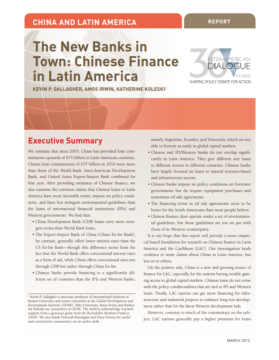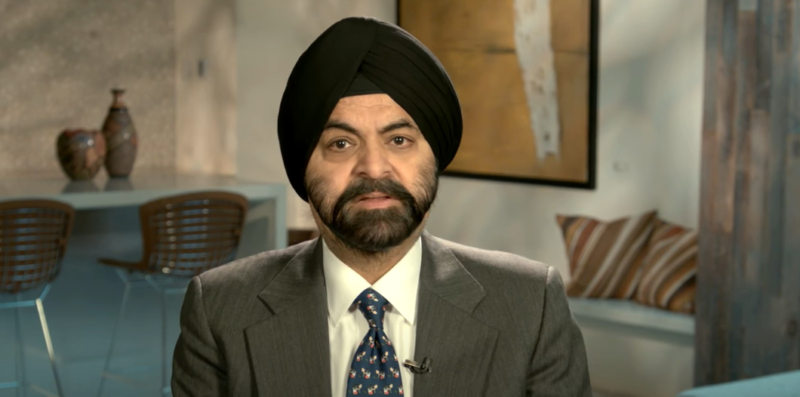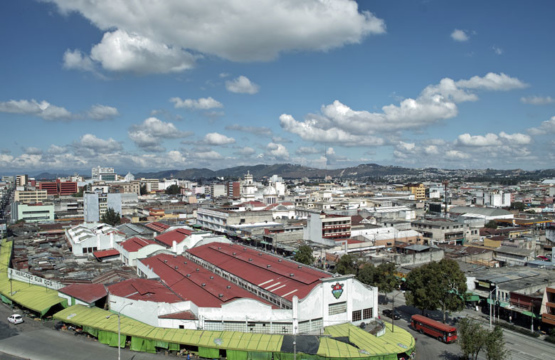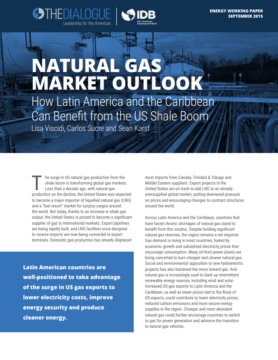
The New Banks in Town: Chinese Finance in Latin America
Estimates of the volume, composition, and characteristics of Chinese lending to the region since 2005.
A Daily Publication of The Dialogue
The administration of U.S. President Joe Biden on Feb. 23 nominated Ajay Banga, the former chief executive officer of Mastercard, to succeed David Malpass as president of the World Bank. Banga’s nomination marks the beginning of a confirmation process likely to take months before the World Bank’s board makes a final decision. The United States, which is the World Bank Group’s largest shareholder, traditionally selects the organization’s leader. If confirmed, what would Banga bring to the role, and what does his nomination mean for Latin America and the Caribbean? What should the World Bank’s next leader prioritize, and what challenges face the organization’s next president?
Alicia Bárcena, former executive secretary of the United Nations Economic Commission for Latin America and the Caribbean: “Latin America was hard hit by the Covid-19 pandemic in social and economic terms, with rising inflation due to high food and fuel prices, and it faces low growth rates: 1.6 percent in 2023 and 2.3 percent in 2024. Poverty has reached its highest rates in decades—around 30 percent—with increasing levels of unemployment and labor informality as well as setbacks on health, education and nutrition. The region is among the most vulnerable to the effects of climate change and comprises around 29 middle-income countries. The challenges ahead are increasing debt, as well as encouraging growth and productivity with new and better jobs with women’s participation at the center. The World Bank must foster inclusive development based on investment, preferably green investments, to enable the energy transition toward renewables and also to accelerate digitalization. Development with equality is needed to drive growth and ensure improvements in people’s lives. The services provided by the bank as a source of financial and technical assistance are key at this critical juncture; there is a need for investment supported by ample social pacts with all stakeholders at the table. This is the only chance for this turbulent region to survive major political shifts, with accountability and full access to information and participation. This is the only way to empower communities. Finally, as a key global player, the bank must lead toward a stronger international financial architecture and bolster multilateralism with recognition of the role of middle-income countries as key partners of global financial stability. In short, it is time to have a true leader at the bank, preferably a woman.”
Isabel Saint Malo, member of GWL Voices and former vice president and foreign minister of Panama: “The World Bank, like many of the multilateral organizations that are the backbone of the international agenda, is part of a framework facing deep challenges starting with leadership systems that perpetuate biases entirely at odds with official declarations. Nowhere is this more evident than in the role of women. The advocacy group for multilateralism and gender equality GWL Voices, made up of 62 global women leaders, has just completed the first systematic mapping of the gender of leaders in the world’s 32 most important international organizations. Our report shows that, on average, women have been in charge for less than 15 percent of the time since these institutions began to operate. Despite the work of the 67-year-old U.N. Commission on the Status of Women, which describes itself as the principal global policymaking body dedicated to gender equality, only a third of these organizations are currently headed by a woman. Twelve—including the World Bank and all four of the world’s largest development banks—have never been led by a woman, and five have elected a woman president only once in their entire history. While Ajay Banga is qualified, it is time for the World Bank to be led by a woman. Gender equality is a start in rebuilding trust and leading reform within organizations that claim gender balance but have never achieved it. A new management by women could dismantle any remaining internal barriers to the advancement of women professionals. The next leader of the World Bank will need to generate fresh resources that Latin America and the Caribbean needs and will have to continue the work towards the Sustainable Development Goals. Leading by example is a prerequisite for trust, and gender balance is part of the SDGs. It is time for the organization to take the steps toward gender balance that it professes for the countries in which it works. The world is full of women with qualifications like the candidate the Biden administration just nominated.”
Riordan Roett, professor and director emeritus of the Latin American Studies program at the Johns Hopkins University’s School of Advanced International Studies: “The nomination of Ajay Banga to lead the World Bank is an inspired choice. It maintains the U.S. historical option to nominate an American citizen (leaving it to Europe to do the same for the IMF), while highlighting the importance of the ‘Global South.’ Mr. Banga was born, raised and educated in India, but his very successful private sector career has been in the ‘Global North.’ He brings decades of experience in the private sector at Mastercard and most recently at General Atlantic. It is important to note that he was actively involved in Citibank’s microfinance sector from 2005-2009. As the world confronts major disruptions in food and energy supplies, continuing political and economic uncertainties, and heavy debt burdens in the poorer developing countries, skillful managerial abilities will be required at the World Bank. The reconstruction of Ukraine, which will need massive economic assistance, will necessarily involve the bank, and new leadership perspectives different from the rather stale ones of recent years will be welcome and needed. Latin America and the Caribbean should receive a welcome, open-minded perspective from Mr. Banga, who understands the challenges of managing development, a talent often overlooked in recent decades.”
Tobías Belgrano, director of Latin American affairs at The New Global Order: “Many have seen the nomination of Ajay Banga, an Indian-born American business executive from Mastercard, as an unorthodox move that sends a message to developing nations that their interests will not be taken for granted as they will have a voice to represent them. However, this same logic applies to big financial service companies, who under this new administration, will not see their interests compromised. In this sense, Mr. Banga’s nomination raised some concerns. Jeff Hauser, an executive director who fights corporate influence in Washington, affirmed that Banga’s trajectory does not inspire confidence and that Biden’s candidate will not turn the World Bank away from predation by Global North corporations upon Global South countries. However, Mr. Banga’s career also included achievements in Latin America by promoting financial inclusion among the poor. During his executive experience at Mastercard, he cooperated with the administration of Mexican President Andrés Manuel López Obrador on digitizing social programs handled by the Mexican government, providing transparency, security and innovation among its beneficiaries. Furthermore, other voices of support have arisen in Latin America. According to Argentine media, Economy Minister Sergio Massa has already expressed his support for Mr. Banga’s candidacy. But only time will tell if Biden’s candidate will prioritize developing regions such as Latin America, which greatly need policies regarding financial inclusion as the ones Mr. Banga promoted.”
 The Latin America Advisor features Q&A from leaders in politics, economics, and finance every business day. It is available to members of the Dialogue’s Corporate Program and others by subscription.
The Latin America Advisor features Q&A from leaders in politics, economics, and finance every business day. It is available to members of the Dialogue’s Corporate Program and others by subscription.
Estimates of the volume, composition, and characteristics of Chinese lending to the region since 2005.
Remittances can build prosperity, rather than simply sustain survival, in communities throughout Central America.
Given their close proximity to the United States, LAC countries are well-positioned to capitalize on the surplus of US gas exports and current buyer’s market.
 The Biden administration last month nominated former Mastercard CEO Ajay Banga as the next president of the World Bank. // File Photo: Mastercard.
The Biden administration last month nominated former Mastercard CEO Ajay Banga as the next president of the World Bank. // File Photo: Mastercard.

